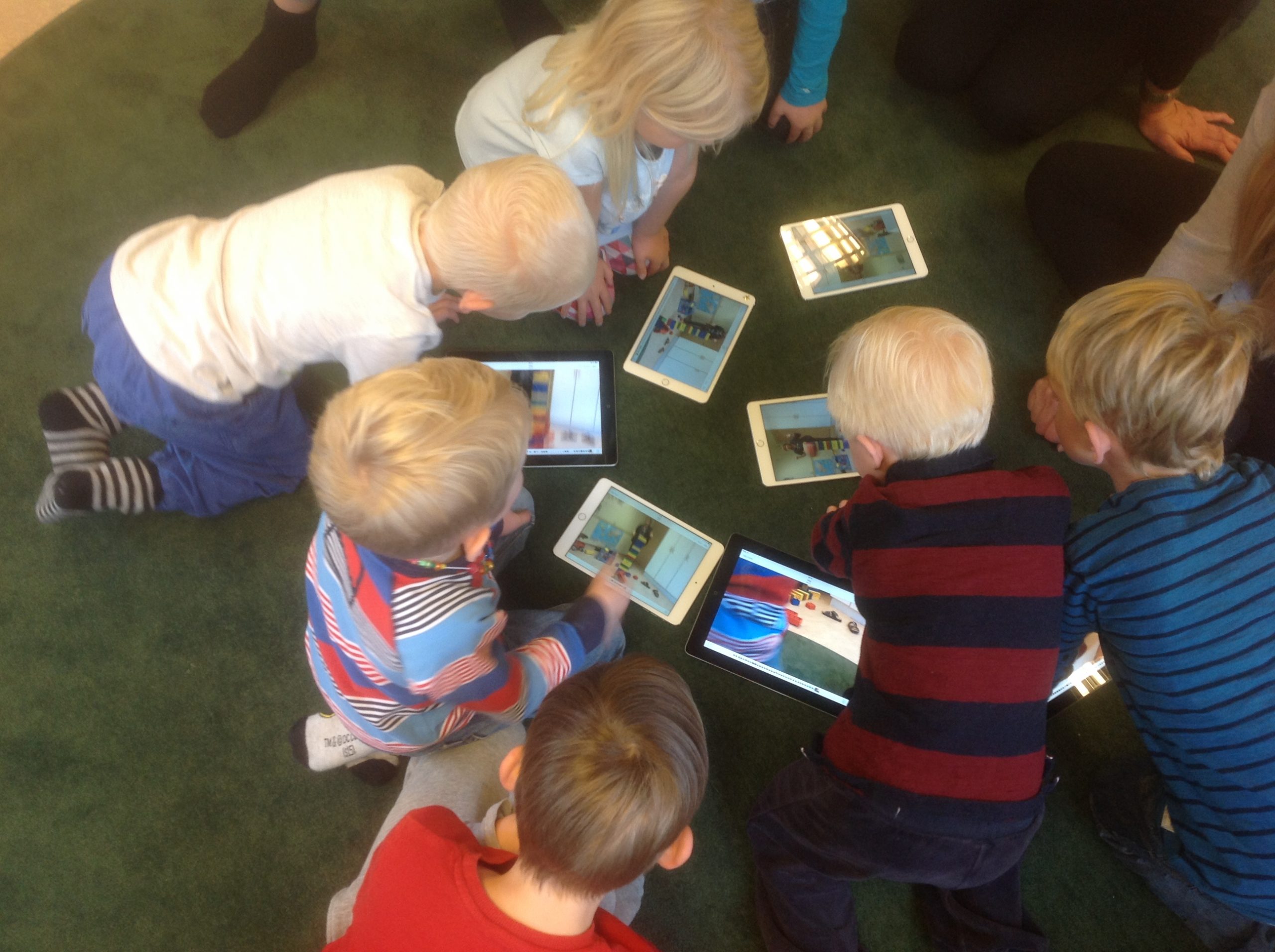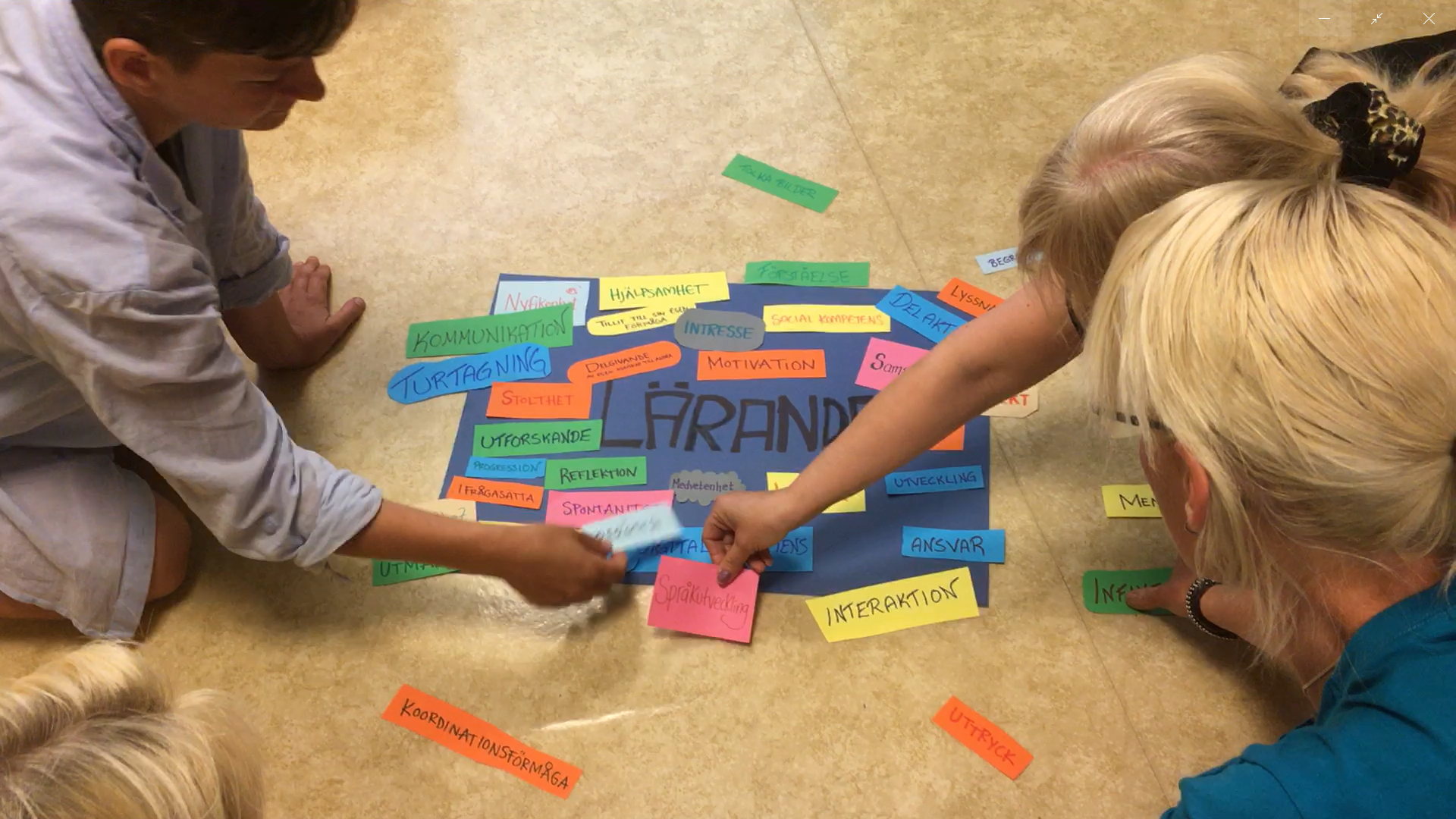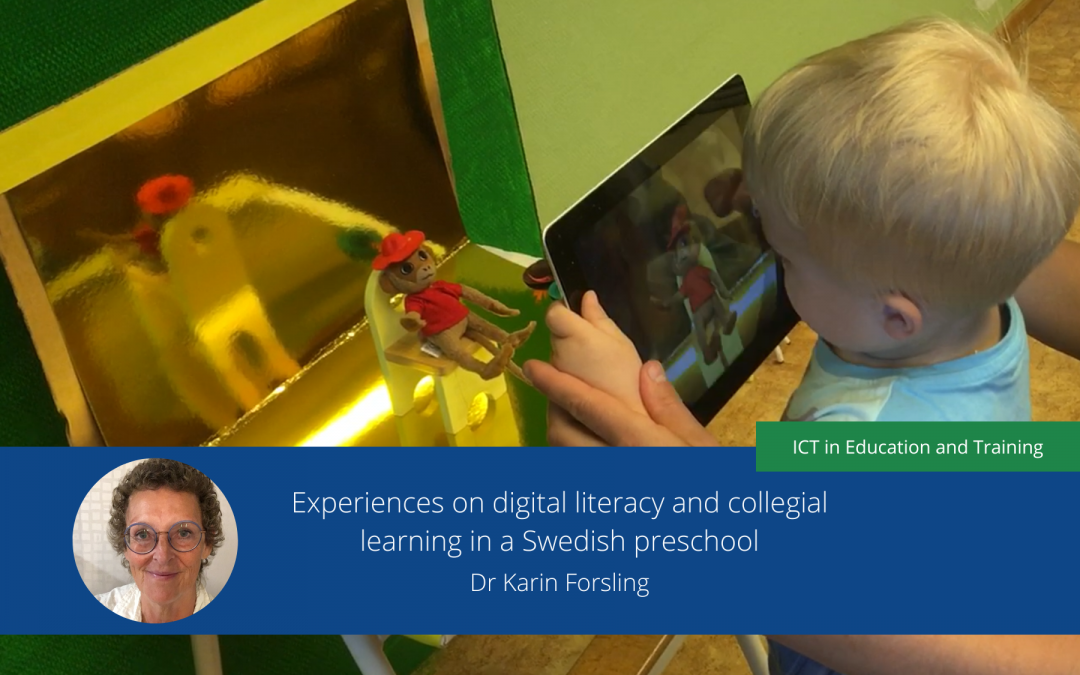At a time when developing digital literacy is high on the agenda, an interdisciplinary starting-point may provide opportunities for daily activities at preschool. This approach may involve the preschool teachers’ own digital literacy, their ability to lead activities, integration of digital tools and resources, as well as their approach to using digital tools critically and responsibly. In addition, it involves extended teaching skills. Timperley (2019) argued that collegial learning is extremely valuable for successful practice in preschool. Research shows that personal and professional development go hand in hand and that development is closely related to how knowledge is put into practice at the preschool, for instance in relation to scaffolding – to build on what a child already knows to provide a strong support base (cf. Hernwall, 2016; Letnes, 2017).
A study on the effect of digital tools on learning situations in preschool

The aim of the study presented here was to investigate how preschool teachers understood, changed, and improved learning situations when digital tools were used under the supervision of a film educator, a preschool colleague, and a researcher. Two preschools, situated in a small Swedish town, participated. One of the teachers, Mia, was engaged as a co-researcher. In total four teachers, two from each preschool, and 25 children aged four to five participated. Design-based experiment (DBE) method was used to collect data. The data collection was built as a spiral, starting with a teacher-led photo activity with the children. I, as a researcher, filmed the activities and the film sequences were then used as discussion material in the later reflection session together with the participating teachers. The insights were forwarded and discussed by the staff at a pedagogical meeting, to be the base for the teachers’ next photo activity, and so on. The experimental aspect lay in the researchers, the co-researchers, and the teachers’ receptivity to the unexpected and their didactic flexibility.
The film educator initially introduced a predetermined photo activity model to the participating teachers:
- Photo assignment
- Show-and-tell (each child chose one of their photos to talk about)
- New assignment
Development of didactic flexibility and digital literacy

In the analysis, it turned out, that he teachers assumed active roles as designers of digital learning situations. This form of agency was intimately linked to flexibility and collegial learning. The teachers expressed that they had undergone professional development during the study. This involved handling tablets, and understanding their usefulness as pedagogical tools.
The teachers pointed out that the new insights surprised them. The important question: What did you think here? was put more often to both children and adults. When the teachers discussed preschool goals, they emphasized teaching and guiding and creating wonder. ”It is important to guide, control, and challenge”, one of the teachers said. ”We have been exploring,” said another. Being conscious and confident in the learning situation were qualities often mentioned in the interviews.
New insights related to transparency and structure, gave confidence as well as freedom to explore and develop. They talked a lot about taking an interest in children’s thoughts and reflections.
We caught the children’s interest: what will happen? The tasks were important. Important to show each other. What did you think here? That children understand that they have understood something in a different way from their friend. It was also a good training waiting for their turn.
— Ulla
The cultural and educational environment at the preschools improved. The teachers testified to being inspired and having new ideas and said that they wanted to continue using tablets in the preschool:
Based on the tasks we have given, I feel more comfortable in conveying to them what they should do. New ideas and how develop them further. And how to use this [tablet] as a tool.
— Helena
We are in the process of developing our own reflection sessions based on the children’s pictures and thoughts. We have really implemented it.
— Mia
Role of the reflection sessions
Collegial processes of learning took place during the reflection sessions. In turn, this affected confidence, approaches, and concrete work in the team and in the groups of children. Self-reflection and reflection on the actions of colleagues in the video sequences created a greater sense of agreement in the team. The teachers talked about benefitting from each other’s competences and the importance of being present as teachers.
We complement each other, pool our knowledge, get to know each other’s approaches and view of children. We know how our colleagues think in different situations and then it’s easy to support and push each other. Thanks to the reflections, learning is good.
— Kajsa
The teachers at one of the preschools started to video record each other and themselves to study and reflect on their actions in different learning situations. They described reflection sessions as the basis for development in a safe and sound environment. One of the teachers talked about how reflection opportunities had been an asset in team development and how they had been challenged and forced to express their thoughts and actions in words.
We clearly see what the children do from their perspective, how we can build on that the next time. How we should think. It is also the way this creates consensus and a sense of safety in the team.
— Mia
Collegial Learning and digital literacy– some reflections
Success factors for providing digital literacy to children in preschool are the teachers’ competence and ability to lead activities, integrate digital tools and resources in teaching, and give children clear and attainable challenges. This further requires that preschool teachers and other staff are familiar with the use of digital tools. This study shows how five committed teachers with no particular digital habits or interest in digital tools used tablets in preschool as a teaching tool to reach curricular goals relating to communication. The use of digital tools affected the interaction between individuals and between individuals and artefacts. The teachers learned from each other and were inspired by modelling, good examples, reflecting together and on their own.
A meeting-place for collegial learning emerged in the intersection between activities, reflection sessions, and staff discussions. There were opportunities for the participants to evaluate and continuously reflect, which also Thomas (2011) emphasizes as important factors in developing digital literacy. The teachers’ reflections on their teaching practice are prominent in the study. They remarked on their discovery of their professionalism. Furthermore, the study shows the importance of internal as well as external agents in development work.
Initially, it involves individuals who want to and can make a difference. The teachers described how the persons with more knowledge, the film teacher, the co-researcher and the researcher, could support their learning. Modelling by the film educator added structure and practical exercises and the reflection sessions in connection with exercises provided conditions for collegial learning, which resulted in understanding and explorative development of possible digital practices in the preschools.
My role as a researcher was to document sequences of learning in practice, not for the sake of displaying learning per se, but sequences demonstrating the process of learning. Discovering and reflecting on learning was the task of the teachers. The experimental community was central and I acted as a sounding board without reducing the teachers’ agency.
As a design-based researcher, my purpose was to draw attention to preconceived notions in order to let the participants in the conversation become aware of how their way of thinking and working in the team could change (cf. Åsén Nordström, 2017). It is possible, though, that the co-researcher Mia—was the most important factor in relation to the aim that preschool teachers should get tools to understand, change, and improve learning environments and situations where digital tools are used.
Key Messages
Success factors for providing digital literacy in preschool (“The experimental community”):
- teachers’ motivation and intrepidity
- familiarity with the use of digital tools
- progressive challenges
- continuously opportunities for collegial reflection
- cooperation with other preschools
Other blog posts on similar topics:

Dr Karin Forsling
Senior lecturer at Karlstad University, Sweden
Karin Forsling, born 1953, works as a lecturer in Special Needs Education at Karlstad University, Sweden. Her research focuses on pupils´ literacy in digital learning environments in preschool and school. After her defense, 2017, Karin has written a number of articles and book chapters. She is a member of Nationella Literacynätverket, Nordic Literacy Research Network, Undervisningens digitalisering, Nationella forskarnavet Digitalisering i förskolan, and Excellent Teaching for Literacy.
She can be found on Researchgate, Linkedin and Scopus. orcid.org/0000-0003-1489-700X
References and Further Reading
Hernwall, P. (2016). ‘We have to be professional’—Swedish preschool teachers’ conceptualisation of digital media. Nordic Journal of Digital Literacy, 11(1), 5–23. https://www.idunn.no/doi/10.18261/issn.1891-943x-2016-01-01
Larsson, P. (2018). Kollegialt lärande och konsten att navigera bland begrepp [Collegial learning and the art of navigating through concepts]. In N. Rönnström & O. Johansson (Eds.), Att leda skolor med stöd i forskning—exempel, analyser och utmaningar. Natur och kultur.
Letnes, M. A. (2017). Legende Læring med Digitale Medier [Playful Learning with Digital Media], Akademisk Forlag. https://www.akademisk.dk/legende-laering-med-digitale-medier
Lpfö18, Läroplan för förskolan. [Curriculum for the preschool]. Skolverket.
Thomas, A. (2011). Towards a transformative digital literacies pedagogy. Nordic Journal of Digital Literacy, 6(1–2), 89–102. https://www.semanticscholar.org/paper/Towards-a-Transformative-Digital-Literacies-Thomas/6cf9b2ea264ab068783ed84bc666d82732814bab
Timperley, H. (2019). Det professionella lärandets inneboende kraft [The inner force of professional learning]. Studentlitteratur. https://www.studentlitteratur.se/kompetensutveckling/skola-f-6/ledarskap-och-skolutveckling/det-professionella-larandets-inneboende-kraft
Åsén Nordström, E. (2017). Kollegialt lärande genom pedagogisk handledning (Collegial learning through pedagogical supervision). Liber.
The full article:
https://link.springer.com/article/10.1007/s10643-021-01289-9

